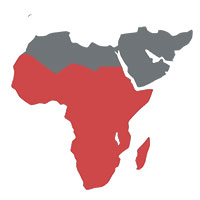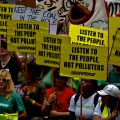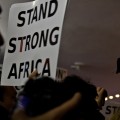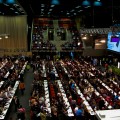South Africa: Injustice Starts with Oppression
admin | December 4, 2011.
South Africa has shown the world before how injustices can be overcome. Why are they allowing for different, but injustices nonetheless, still occur to the planet?
When two little girls, two and five years old, are killed because of greed; there is reason to be concerned about our values. Our shameful idleness that forces us to travel in carbon-spitting vehicles or refuse to switch off energy draining products, have apparently become worth the death of our children.
Kandi Mosset, a Native Energy and Climate Campaign Organiser for the Indigenous Environmental Network, broke down in tears in the People’s Space at the United Nations climate negotiations in Durban as she revealed heartbreaking situations of injustice in North Dakota, her hometown.
Mosset grew up on a reservation where resources are now being exhausted by up to 15 different oil companies. “Recently four people died in a car crash organised by one of the fuel industries. Two of them were little girls. Nothing happened with this case, just like with many others. We don’t even know which company is responsible for what injustice anymore. We don’t want to take it anymore. I am sick and tired of these injustices!”
 Mosset spoke after a protest outside a Royal Dutch Shell refinery in Durban, where a number of indigenous activists joined youth to support the Athabasca Chipewyan First Nation (ACFN) community in their lawsuit against the oil company Shell.
Mosset spoke after a protest outside a Royal Dutch Shell refinery in Durban, where a number of indigenous activists joined youth to support the Athabasca Chipewyan First Nation (ACFN) community in their lawsuit against the oil company Shell.
ACFN is requesting $1.5 million from Shell who have allegedly blocked requests for money to be used on sustainable development and education initiatives in their traditional aboriginal community under agreements made between 2003 and 2006.
“Shell has left a trail of broken promises and ravaged ecosystems. They have been pushing their dirty fossil fuels plans on every country they can bully,” said Eriel Deranger, a community member of ACFN and director of Sierra Club Prairies.
“Our peoples and our environments have been turned into a colony for companies like Shell, who profit from our suffering. Knowing full well the extent of brutality that Shell has delivered to my fellow Nigerians, we stand in solidarity to say ‘get the Shell out of here,’” said Nnimmo Bassey, director of Nigerian NGO Environmental Rights Action and winner of the Alternative Nobel Prize.
The issue of inequality lingers in the air at COP17. Oppressed groups from across the globe are using COP17 as a platform to make their voices heard – possibly the only opportunity they’ll ever get on the international stage. They have come to Durban in hope of finding justice, fully aware of South Africa’s history as a platform for equality.
 After South Africa’s first democratic election in 1994, the country has taken pride in the promotion of human rights. Yet, according to participants present at the Indigenous People’s Protest, South Africa is covertly allowing for citizens to be forcibly removed from their homes in rural areas of Durban by companies such as Shell. “A group of underprivileged people live near the severely polluted area that serves as the base for one of Shell’s projects. Now they are being removed from the only home they know because Shell wants to expand the project,” Kandi said.
After South Africa’s first democratic election in 1994, the country has taken pride in the promotion of human rights. Yet, according to participants present at the Indigenous People’s Protest, South Africa is covertly allowing for citizens to be forcibly removed from their homes in rural areas of Durban by companies such as Shell. “A group of underprivileged people live near the severely polluted area that serves as the base for one of Shell’s projects. Now they are being removed from the only home they know because Shell wants to expand the project,” Kandi said.
South Africa once turned a blind eye towards injustice, using every excuse from blatant racism to religious divides. What is the reason for turning a blind eye now?
Perhaps South Africans have decided that putting an end to racism was enough, and they haven’t found their second breath again to fight for the oppressed. Or have the South African government’s moral compass been soaked with the oil industries’ manipulation? The terrifying truth is, each one of us contributes to injustice – oil companies are simply keeping up with the demands that we create.













comment